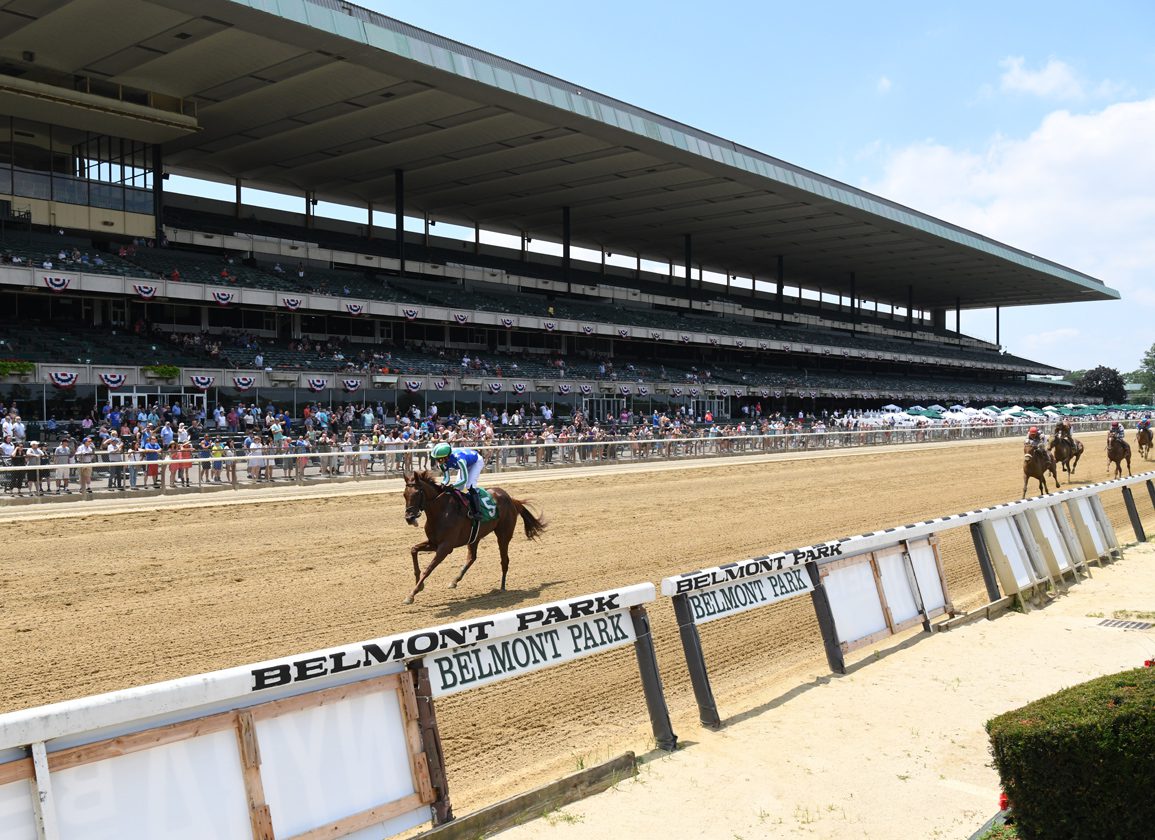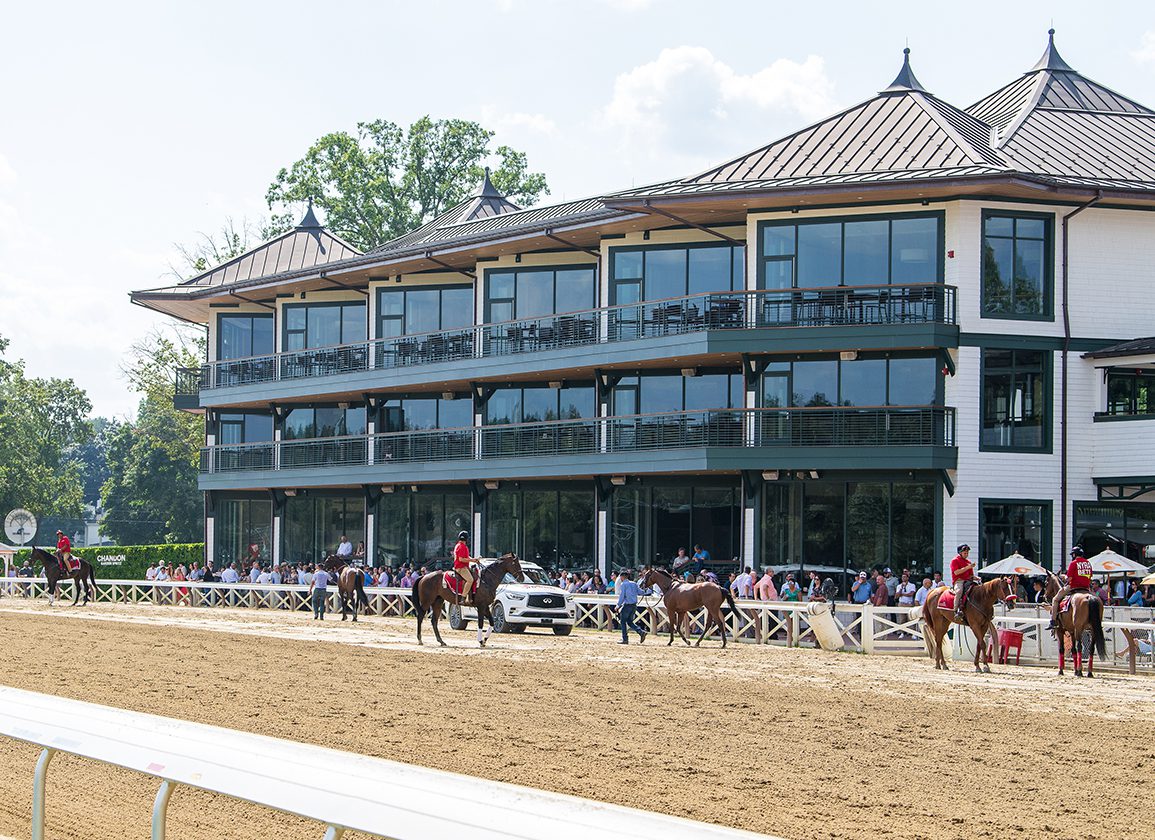By T. D. Thornton
Last week's announcement that the 2024 GI Belmont S. will be migrating north to Saratoga Race Course for 2024 because of the $455-million extensive renovation of Belmont Park made official a move that the New York Racing Association (NYRA) has been openly discussing for months.
But since the press release from the New York governor's office came out during a slow time of the year for racing news, it rekindled speculation about the ramifications of tinkering with the historical significance of the third jewel of the Triple Crown.
The debate is healthy. It means fans care.
But the racing world isn't about to tilt off its axis because of changes that will probably end up making the best of an unavoidable, temporary transition.
Cutting back the 1 1/2 miles “Test of a Champion” distance of the Belmont S. to 1 1/4 miles generated the most outcry.
The feasibility of moving the four-day (Thursday-Sunday) Belmont S. festival upstate for one long weekend June 6-9 instead of just running it at Aqueduct Racetrack was a distant second in the discussion.
And although it was not specifically addressed in the official release, the expectation is that the Belmont Park construction will extend through 2025, meaning that the site and distance switch figures to be in play for at least the next two runnings of the Belmont S.
The purse of the race will also be getting a boost, from $1.5 million to $2 million.
The last time Belmont Park was closed for a major facelift, from 1963-1967, the Belmont S. got shifted to Aqueduct, which accommodated the 1 1/2 miles distance without incident by starting the race on the far turn at the three-eighths pole.
Since both Saratoga and Aqueduct feature nine-furlong main-track ovals, that would be the start point for any 1 1/2 miles dirt race at either venue (without resorting to an alternate finish line).
It would be an awkward (but not impossible) configuration to attempt, so NYRA has opted for the two-furlong cutback.
To some racing enthusiasts, that's absolute heresy that will sully the Triple Crown with asterisks if a horse manages to sweep the series at the truncated Belmont S. distance.
Others are simply shrugging their shoulders and accepting the short-term trim as a historical aberration, noting that over the past century and a half, there have been a number of tweaks to the distances, order, time spacing, and venues of all the Triple Crown races.
With that in mind, maybe the best outcomes to root for in 2024-25 are close, competitive editions of the Belmont S. with no one horse sweeping the series.
One longer-term concern about the distance switch is that horse owners and trainers might end up liking the 10-furlong Belmont S. so much that they'll push for the change to become permanent under the argument that it better suits modern-day Thoroughbreds who are bred for speed rather than stamina.
If the 1 1/4-mile runnings of the race end up luring large fields, this theory could have some legs.
But it would be difficult to imagine NYRA officials wanting to unveil the brand-new Belmont Park in 2026 by starting its showcase race in another awkward spot, this time on the first turn. That's where the few main-track races carded at 10 furlongs must begin over Belmont's 1 1/2-mile circumference.
As to the wisdom of choosing Saratoga over Aqueduct, the question comes down to location, location, location.
And context.
Yes, the logistics of running the Belmont S. at Aqueduct would be far easier than moving the meet (and a small army of backstretch workers and track employees) upstate for just four days. Remember, after the Belmont-at-Saratoga mini-meet, racing is to return downstate to Aqueduct for another month before then coming back to the Spa July 11 for the traditional 40-day summer season.
You could maybe make a minor case for wanting to give utilitarian Aqueduct a fitting send-off salute by allowing it to host a Triple Crown race for two years before the property likely gets sold and repurposed (all of NYRA's downstate racing and training is envisioned to get consolidated at Belmont Park after the construction project is complete). If it worked in the 1960s, why not the 2020s?
Recall that at the time of the last Belmont Park rehab 60 years ago, Aqueduct had just undergone its own three-year renovation (completed in 1959) and was being hailed as “the world's most modern and luxurious horse plant,” as per the Associated Press.
And in 1963, Saratoga was still a relatively sleepy hamlet that hosted seasonal racing for only a few weeks each summer. So moving the Belmont S. there would have been considered an unlikely (even absurd) proposition the last time this type of venue switch had to be considered.
Now fast-forward six decades: Aqueduct has long since been retrofitted from a primary racing plant to a full-blown racino with not enough seating or trackside amenities to accommodate the 50,000 attendance cap for the Belmont S.
And Saratoga? Its stature and infrastructure have both blossomed in the other direction, with numerous “premium seating” renovations added over the past few years to more readily accommodate the hospitality needs of a special event like a four-day weekend.
Plus, simply from a cachet standpoint, the racing-centric, tourism-ready, boutique atmosphere in upstate Saratoga provides an exclamation point that workmanlike Aqueduct in Queens could never match.
Yet the move is not completely without drawbacks. There will be legitimate gripes about another major racing event being pushed farther out of the grasp of the everyday horseplayer who wants to see important stakes in person.
Remember how-for decades-racing used to promote itself as the only sport in America where admissions were kept at the same price point for blockbuster events as they were for regular, run-of-the-mill, weekday afternoons?
That marketing mantra slid of the grid many years ago. If you remember that type of sloganeering at all, you probably also recall how pay telephones were once strictly verboten at tracks (to keep race results out of the hands of bookies), or how the racing industry used to boast that it was the highest-attended spectator sport in the nation.
Mike MacAdam, writing for the Daily Gazette in upstate New York, pointed out in a Friday article how tickets for the Belmont-at-Saratoga meet, which are expected to go on sale in mid-February, will be largely limited to four-day packaged seating options, with early-access first dibs going to box-seat holders from both Belmont and Saratoga, plus Saratoga reserved season ticket holders and past Belmont S. package purchasers.
“So, for the most part, you won't be able to get single-day seating,” MacAdam wrote.
Noting that pricing and policies have yet to be announced publicly, MacAdam also speculated that Saratoga's fan-friendly carry-in cooler rule could change for the Belmont S. weekend.
“NYRA hasn't announced yet whether fans will be allowed to bring in their own food and beverages,” MacAdam wrote in the Daily Gazette. “It's worth noting that they don't allow outside alcohol on Belmont Day.”
Hotel rooms for the June 6-9 period are going, going, gone, according to news reports by several different upstate New York media outlets.
The Daily Gazette reported in a separate story by Shenandoah Briere last Wednesday that Saratoga hotel rooms at Embassy Suites that had been advertised at $285 to $335 a night prior to the governor's announcement about the Belmont S. quickly got bloated by supply and demand to up over $1,100 per night.
On Sunday, a TDN check of lodging availability at the higher-end Adelphi Hotel yielded Friday and Saturday rates listed for as high as $4,022 per night, with a three-night minimum stay in effect.
There is no word yet on how much a spot on someone's spare couch in one of the outlying towns in the Saratoga region might cost you, but we'll keep you posted over the long winter between now and the sure-to-be-unique, first-ever Belmont-at-Spa fest.
Not a subscriber? Click here to sign up for the daily PDF or alerts.







